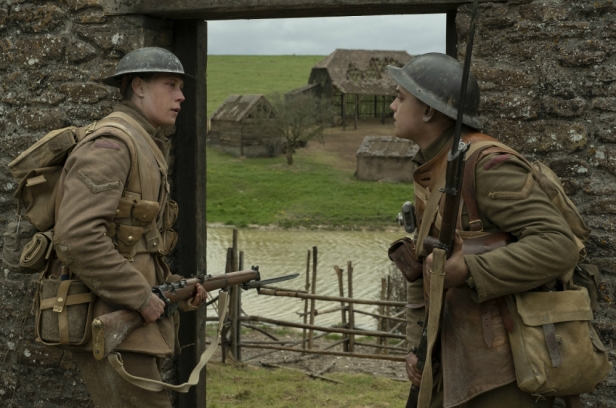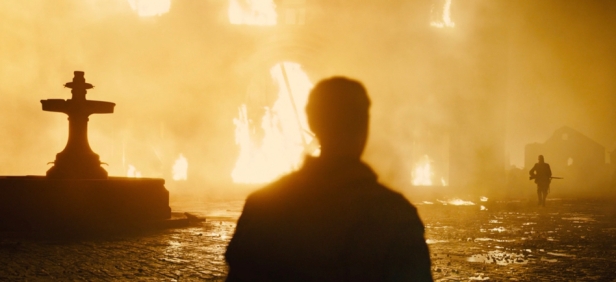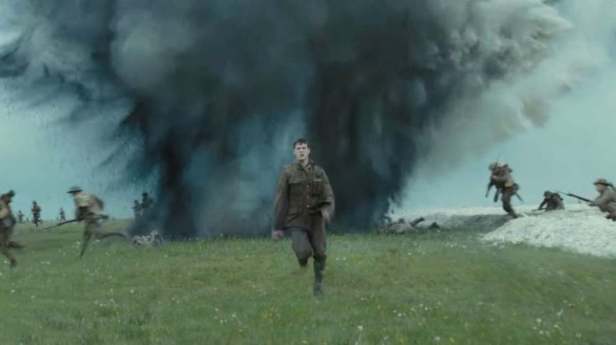“I think a curse should rest on me – because I love this war. I know it’s smashing and shattering the lives of thousands every moment – and yet – I can’t help it – I enjoy every second of it.” This quote is a confession from Winston Churchill to his friend in 1916, not from the movie 1917, but it seems applicable when viewing a film as finely crafted as 1917. One can’t help but be entertained by the intimate story and cinematic spectacle, even as you know that, unlike say Star Wars or The Avengers, the tragedies onscreen are taken from history. In fact, this movie was born from actual stories that director Sam Mendes’ grandfather would tell him as a boy. Those stories planted a seed that grew into the simple tale within a breathtaking, heartbreaking world that is 1917.

While obviously not achieving the same level of authenticity as the restored footage and interviews of 2018’s WWI film They Shall Not Grow Old (which might be Peter Jackson’s best work since Lord of the Rings– seriously, check it out), 1917 plunges you into the middle of the Western Front. Specifically, we’re thrown into the middle of the British trenches in France, mere yards from the menacing German trenches across the hellish No Man’s Land. They’ve been there for months, fighting for inches, living next to their their fallen comrades, who are still lying among the barbed wire and artillery craters. For a little over 2 hours, the viewer is taken on a journey through enemy territory with two British soldiers (played fantastically by Dean-Charles Chapman and George Mackay) as they race to save sixteen hundred men (including a brother) from a deathtrap the next morning. British powerhouses such as Benedict Cumberbatch and Andrew Scott also appear for brief periods (whoever knew that Sherlock and Moriarty both served?!).

It’s a deceptively simple premise for an extremely rich movie. The special effects are seamless, the locations jaw-dropping, and the details of the WWI setting may encourage some viewers to dig more into the history of this lesser-known war after the viewing. However, the one-shot camera style truly shines and sets 1917 apart from other war epics. Instead of coming off as a gimmick, the continuous, unblinking camera makes the viewer feel as if they’ve traveled the whole way as well, as I could literally recall every single step in the geography if I needed to. The technique also effectively makes everything about the story- the characters, their plight, and the stakes- feel extremely personal. It’s hard to describe how much easier it was to get lost in the film without quick cuts and sudden swooping overhead views reminding you that you’re watching a movie. Of course there’s nothing wrong about that style of modern shooting, but 1917‘s intimate cinematography style created more of a memorable experience, versus a memorable viewing.

Conflicting elements appear everywhere in 1917. The beauty of the French countryside is often juxtaposed next to the horrors of war, often when you least expect it. Are the British leaders incompetent men or heroes in an impossible circumstance? Is the film itself even pro-war or anti-war? Maybe a little of both, as it displays the futile carnage of warfare (storming trenches in particular) while at the same time focusing on the sheer bravery of Blake and Schofield. Even as I watched, I wavered between wildly entertained and emotionally drained by the end. However, what is never a mixed bag is the quality of the film production or my recommendation to watch it. 1917 deserved every Golden Globe it received, and while I enjoyed Joker (even if it didn’t work as Batman story), I’m definitely pulling for the achievement of 1917 to take the Academy Award for Best Picture away from the clown. It’s unique, original, and striking. And it’s all thanks to one grandfather, sharing stories of his life with his grandson.
